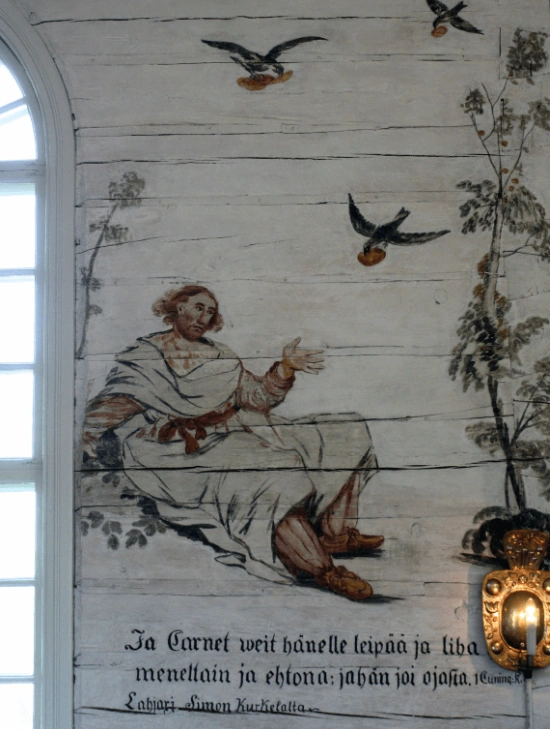9922. 'In the middle of them round about' means consisting of the more internal features of the factual knowledge of good in every direction. This is clear from the meaning of 'in the middle' as what is more internal, dealt with in 1074, 2940, 2973, 5897, so that 'in the middle' - when it has reference to the hearing and understanding of religious teachings and of worship, which are meant by 'bells' - means from more internal features; from the meaning of 'pomegranates', in the middle of which the bells were, as factual knowledge of good, dealt with above in 9918; and from the meaning of 'round about' as in every direction, as above in 9920. Bells were placed in the middle of the pomegranates because known facts, meant by 'pomegranates', are the recipients, so to speak vessels, that hold truth and good within them, 1469, 1496, 3068, 5373, 5489, 7770; and religious teachings and worship, meant by 'bells', must consist of the good and truth which reside inwardly in known facts as their vessels. If they do not consist of that good and truth, only of known facts, they have no life in them.
[2] But since few can understand the nature of what has just been said - that religious teachings and worship must consist of the good and truth which reside inwardly in known facts, but not of known facts devoid of them - an intelligible explanation, so far as this is possible, will be given. The term 'known facts' or 'factual knowledge' describes all things contained in the external or natural memory; for there is the external memory, consisting of things in the natural world, and there is the internal memory, consisting of things in the spiritual world, see 2469-2494, 2831, 5212, 9394, 9723, 9841. The things which have been inscribed on the internal memory are not called known facts, because they are the things constituting a person's life; instead they are called truths belonging to faith and forms of good belonging to love. These are what must be present inwardly in known facts. For in the human being there is an external, called the external man, and an internal, called the internal man; the internal must be in the external, as the soul is in its body. Accordingly those things which are in the internal man must reside in those which are in the external, for in this way the external has a soul or life within it. Therefore if the internal things, or things of the internal man, are not in the external ones there is no soul in them, nor thus any life. Because the good of love and faith is internal it follows that external things must have that good in them, and so must known facts since known facts, as already stated, are recipients, so to speak vessels, that hold internal things. Consequently religious teachings and worship must consist of those things contained in the recipients or vessels; they do not reside in recipients and vessels that are empty or devoid of such contents. From all this it is evident how to understand the explanation that all aspects of religious teachings and of worship must spring from the more internal features of the factual knowledge of good, which are meant by the declaration that bells of gold should be in the middle of the pomegranates.
[3] In addition it should be recognized that there is factual knowledge of good and factual knowledge of truth, and that truths residing on this level are once again recipient vessels of good; for the truths of faith are vessels for the good of love. For light on this matter, see what has been stated and shown already regarding factual knowledge or known facts,
Known facts are things belonging to the memory in the natural man, 3293, 3309, 3310, 4967, 5212, 5774, 5874, 5886, 5889, 5934.
By means of known facts the internal man is opened, 1495, 1548, 1563, 1895, 1940, 3085, 3086, 5276, 5871, 5874, 5901.
Known facts are a means to make people wise and also a means to make them insane, 4156, 4760, 8628, 8629.
Known facts are vessels for truth, and truths are vessels for good, 1469, 1496, 3068, 3079, 3318, 5489, 5881, 6023, 6071, 6077, 6750, 7770, 8005, 9394, 9724.
Known facts give service to the internal man, 1486, 1616, 2576, 3019, 3020, 3665, 5201, 5213, 6052, 6068, 6084, 9394.
When known facts, which are things belonging to the external memory, become part of life, they pass from the external memory, but remain inscribed on the internal memory, 9394, 9723, 9841.
People guided by truths of faith rooted in the good of charity can be raised above factual knowledge, 6383, 6384; this is called being raised above the level of the senses, 5089, 5094, 6183, 6313, 6315, 9730.
A person carries with him into the next life when he dies the known facts or things belonging to the external memory, but they become dormant then, and in what manner, 2475-2486, 6931.







